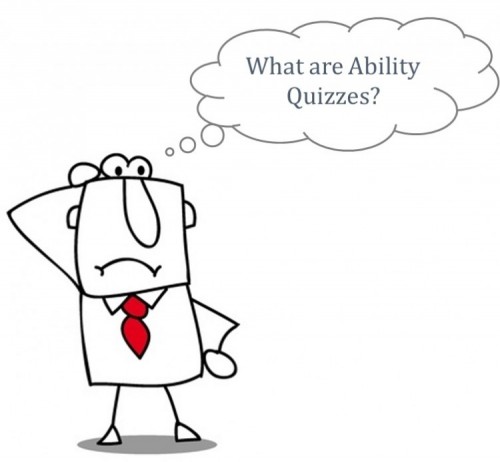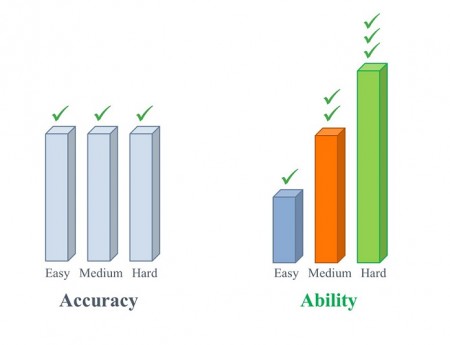
To get you closer to your target GMAT score, e-GMAT is now introducing Ability Quizzes in Scholaranium. Ability Quizzes measure your probable performance on and preparation level for the actual GMAT by measuring your ability to score in a particular section.
Many students use accuracy to estimate their performance. Intentionally or unintentionally they consider accuracy as a proxy for ability. Accuracy-based performance analysis gives a very skewed picture of a student’s actual propensity to score well on the GMAT. To understand how this analysis may have been wrongly affecting your performance predictions so far, read on.
Ability vs Accuracy

Accuracy: It is a measure of how many questions you get correct out of all the questions you attempt. Accuracy DOES NOT take into account the difficulty levels of the questions that were attempted.
By definition, an adaptive test, such as the GMAT, will keep giving you questions that you’re likely to answer correctly. In fact, that is how it determines your performance level and gives you your score. In other words, the GMAT tries to maximize your accuracy. (In algorithmic terms, we can say that the test is trying to arrive at a local maxima of the test-taker’s performance).
Obviously, such behavior makes accuracy a very imprecise measure to estimate your performance on the GMAT. For instance, consider the following attempt data of the Verbal Section collected from GMAT Prep.
| Student | # of Correct Questions | # of Incorrect Questions | Score on Verbal Section | Corresponding Percentile |
| Student 1 | 30 | 11 | V42 | 96 percentile |
| Student 2 | 30 | 11 | V38 | 85 percentile |
| Student 3 | 30 | 11 | V32 | 66 percentile |
| Student 4 | 30 | 11 | V22 | 30 percentile |
Notice how all the four students have exactly same accuracy and yet have a wide difference in their sectional scores. In fact, the difference between the highest and the lowest scores is 66 percentile points!!
Ability: Ability is a true measure of your performance in an area. It takes into account not only the number of questions you marked correctly but also their difficulty levels. The reason difficulty levels are important is that the marks you get for answering an easy question correctly is less than the marks you get for answering a medium question correctly, which in turn is less than the marks you get for answering a hard question correctly.
To sum up, a student with a higher ability in a particular section has a higher propensity to score well in that section and therefore will get a better percentile in the actual GMAT.
What do the Ability Quizzes contain?
Ability Quizzes give you a realistic picture of your preparation level in a section and various topics within it. This is because an ability quiz ensures that you get a representative mix of questions from various topics and difficulty levels – just as you would expect in the actual exam.
You will see 2 kinds of Ability Quizzes in Scholaranium. They are:
- Individual Ability Quiz:
- SC: *Max Time: 22.5 min. Contains 15 questions of varied difficulty levels from the following topics:
i. Subject-Verb, Verbs, Pronouns etc.
ii. Modifiers
iii. Parallelism and Comparison
- CR: * Max Time: 30 min. Contains 15 questions of varied difficulty levels from the following topics:
i. Inference
ii. Boldface
iii. Assumption, Strengthen, Weaken, Evaluate
iv. Resolve the Paradox, Method of Reasoning etc.
- RC: Contains 4 passages of varied difficulty levels from the following categories:
i. Bio Sciences
ii. Business
iii. Economics
iv. Humanities
v. Physical Sciences
Since the number of questions in RC differs per passage, just as it does in the actual GMAT, one does not have the same fixed time for each RC Ability Quiz. However, the system allows for an average time of 2 minutes and 15 seconds for each RC question. So an RC Ability quiz with 12 questions will allow you a total time of 12 x 2.25 minutes. Similarly, one with 14 questions will allow you a total time of 14 x 2.25 minutes.
- Verbal Ability Quiz: * Max Time: 70 mins. Contains 36 questions of varied difficulty levels from SC, CR and RC. The spread of the questions among various sections (CR/RC/SC) is not fixed, a case similar to the actual GMAT. However, the system ensures that you get 3 RC passages from different topics (Humanities/Business /Bio-Science etc.) and difficulty levels, approximately 12 CR questions (all topics and difficulty levels) and approximately 12 SC questions (all topics and difficulty levels).
* the time allotted for each quiz is fixed in such a way that it is not too constraining for you to get overly affected by the pressure to finish the quiz; however, it is not lenient either as we want you to get a realistic estimate of your performance in these sections.
Specification of the system

There are a total of 664 questions in Scholaranium, with the number of hard questions dominating the question pool – the difficulty level of these questions has been determined after a careful and through analysis of more than 100 attempts per question. A more detailed breakup of the question-pool is illustrated in the below table.
| Section | Easy | Medium | Difficult | Total |
| SC |
69 |
88 |
81 |
238 |
| CR |
83 |
84 |
86 |
253 |
| RC |
34 |
65 |
74 |
*173 |
| Total |
186 |
237 |
241 |
664 |
* the number in RC corresponds to 47 passages.
With all these 644 questions unused in custom quizzes, you should be able to take up to 10 Verbal ability quizzes! If you want to take only individual SC, CR and RC ability quizzes, then you will be able to take up to 10 Individual Ability Quizzes in each of them. (Yes, that’s almost 30 quizzes there! 🙂 )
Various Combinations of ability quizzes
Let’s say you want to take all types of ability quizzes. In that case, you can take 5 Overall ability quizzes and still you can take at least 5 each of SC, CR and RC ability quizzes.
Now, let’s say you’re a student who has already exhausted all the current questions in Scholaranium. Even in that case, you should be able to take 1 Verbal Ability quiz. Instead of that you can also take 1 SC ability quiz, 1 CR ability quiz and up to 3 RC ability quizzes. 🙂
That’s not all! Even after you take the maximum possible number of ability quizzes (let’s say you take 10 each of SC, CR and RC ability quizzes), you should still be left with approximately 89 questions in SC, 103 questions in CR and at least 7 passages in RC. This should give you ample number of questions to practice using custom quizzes and thereby improve your performance in a specific topic/section.
For instance, even after taking 9 CR ability quizzes, you’ll still have at least 70 questions from the Assumption family of questions (Assumption, Strengthen, Weaken and Evaluate) which you can use for practice. 🙂
Common Pool of Questions
An important point you need to keep in mind that both Ability Quizzes and Custom Quizzes share the above question pool. This is important because each Ability Quiz is formed by taking a certain number of questions from each topic and difficulty level. Therefore, how you utilize the question bank in Custom Quizzes determines the number of Ability Quizzes you can take.
For instance, Inference type questions are an integral part of the CR section on the GMAT and are, therefore, an essential part of the Ability Quizzes too. This means that if at any point you exhaust all the Inference type questions through custom quizzes, you will not able to take any Ability Quiz with CR in it. So no (more) individual CR ability Quiz for you and no (more) Verbal Ability quiz for you. So, while practicing through Custom quizzes, ensure that you do not go overboard with any one particular question type or difficulty level.
Other Helpful Posts
- What is an Ability Quiz? Click here
- What are the contents of an Ability Quiz? Click here
- Why should you take an Ability Quiz if you already have Mocks? Click here
- How to take an Ability Quiz? Click here
- When should you take what kind of Ability Quiz? Click here
- How can you use Ability Quizzes to Refine your Preparation?














